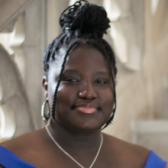One week after the completion of the Moxie program I’m sitting here, wondering if this past summer was a dream. It’s not so much that my experience in New York was fantastical, but it felt like an entirely different world from the one I’m exposed to on a regular basis.
As I’ve gotten back into my routine at home, I’ve had conversations with friends and family about all that I encountered and learned on my trip. And having these conversations made me realize, how little I, and the people in my life, reflect on social issues from the unique perspective of the Moxie program. I’ve been sending my Dad nonstop articles on universal basic income and finding research on increased wages for workers funded by money spent on stock buybacks. I find my opinion of the news I read colored in a different way than it was prior to my eight weeks working for Legal Momentum. I go immediately to read news about Supreme Court decisions now, and have been looking at current events from a perspective of the impact they have on women’s’ rights more particularly.
At the same time, I find myself being more passive day to day in a way we couldn’t be in New York. The 9-to-5 schedule is something I not only got accustomed to but began to enjoy thoroughly. On top of that, the talks we went to, the films we watched, the weekly discussions we had and personal talks with each other made me live life in a reflective manner that pushed me. Working at Legal Momentum allowed me to focus my desire to do something to improve my surrounding community. The Moxie program supported that work and made me think critically about every step I was taking. I’m somewhat nervous that I will start to lose that as I move on to the next stages in life from here. But as I study abroad this coming semester in Paris and engage in a new culture, I want to not only be fascinated by history but be critical of everything that I encounter. And I want to do this when I come back to Duke, as well.
I know that I will keep in touch with my fellow Moxies (and honorary Moxie, my dear friend/mentor Lena Barsky) for long after this summer. I was happily surprised just last Thursday with a video call from Lena, who, along with the other office interns, wanted to say hi and update me on everything happening at Legal Momentum. It’s grant season — so there’s a lot of stress and hard work happening there. The Moxies have been discussing when we’re going to have our first dinner back at Duke at the end of August. It’s because of these things that I know this past summer in New York was in fact real, and the lessons of how to approach life as I move forward will stay with me even as details fade away and I continue to learn new information and experience alternative perspectives.
Thank you so much to Ada and Shannan for facilitating and enriching my life in such an impactful, life-altering way. Once a Moxie, always a Moxie.















